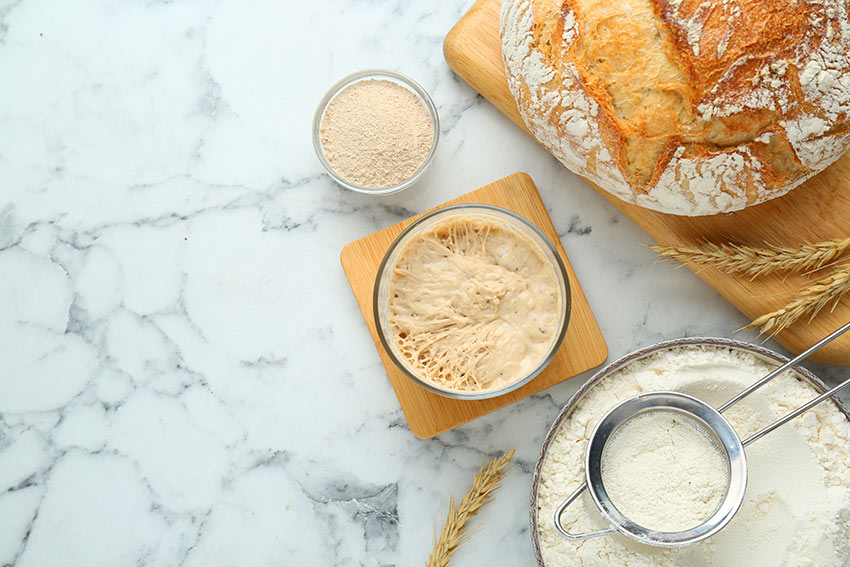Fermentation happens whenever a microorganism acts on a food product and generates something new. Traditional fermentation is anaerobic, but many other fermentations, such as vinegar and soy sauce, are not. Many microorganisms are involved in fermentation, such as yeast for bread, wine, or beer. Lactic acid bacteria are also crucial for yogurt, cheese, kimchee, and …
Fermentation happens whenever a microorganism acts on a food product and generates something new. Traditional fermentation is anaerobic, but many other fermentations, such as vinegar and soy sauce, are not.
Many microorganisms are involved in fermentation, such as yeast for bread, wine, or beer. Lactic acid bacteria are also crucial for yogurt, cheese, kimchee, and sauerkraut. Kombucha, sourdough bread, and kefir have yeast and lactic acid bacteria.
We can use a starter culture or spontaneous fermentation. For example, most vegetables can be fermented in a salt bath, creating a 3% salt concentration and keeping them anaerobic. The cabbage leaf contains a natural amount of Lactic acid bacteria that makes sauerkrauts for you, and so do cucumbers, carrots, and beets. You can easily make this fermentation at home.
Spontaneous fermentation started 5000 years ago or more. Only 400 years ago, we could see these bacteria involved in fermentation under a microscope.
Fish and meat have been fermented since prehistoric times, which has helped preserve food without refrigeration.
A probiotic is a live microorganism clinically proven to provide health benefits at suitable doses. Live cultures are present in many foods, but we can’t call them probiotics until they have been tested for health benefits.
Not all fermented foods have live culture; for example, bread and chocolate are fermented foods without live culture.
There is growing evidence that fermented foods are beneficial. There is a strong correlation between fermented food consumption and a lower incidence of metabolic disease. The higher the intake of fermented foods, the lower the metabolic markers such as fasting insulin, fasting glucose, and fasting tricycle rides.
Enhance is an American database that started in the 1980s, it collects data from thousands of Americans. Correlation studies show that fermented food intake is also associated with improved immune response and decreased inflammatory markers, even in healthy individuals. Lactic acid bacteria are specifically helpful for overall health.
Lactic acid fermentation can happen with many foods. Yogurt is the best-known and most consumed one. Kefir, sauerkraut, and Kimchee are also fermented with lactic acid. Lactic acid fermentation is what makes sourdough bread acid. A commonly used fish fermentation method in Sweden and other Norwegian countries is surstromming. Surstromming (sour Herring) is a lightly salted and fermented Baltic Sea herring. Salt is used to prevent the fish from rotting and allows fermentation that lasts for 6 months. This process gives the fish a powerful smell and an acidic taste.
Elie Metchnikoff,
One hundred years ago, a Russian scientist, Elie Metchnikoff, figured out that people in Bulgaria lived longer because they ate fermented foods. In South Korea, people consume close to 100 lbs. of kimchi per year, and their life expectancy by 2030 is expected to be the highest in the world, being over 85 years old for males and 90 years old for females.
A prebiotic is the food the probiotic eats, while the postbiotics are the products released by the bacteria or the foods we ingest. Research on postbiotics is very new, and we don’t have a clear definition yet. These bacteria metabolites have high bioactivity.
Some of these postbiotics are related to lactate, and they can metabolize amino acids such as aromatic amino acids like phenylalanine, tyrosine, and tryptophan into downstream metabolites. (13.6C: Chemistry of Hormones – Medicine LibreTexts). They can be very beneficial by binding on immune cell receptors. One of these receptors is called er hydrocarbon. The ability of the bacteria to bind to this receptor is low in obese people and people with inflammatory bowel disease. Hopefully, we can help to reduce inflammation and obesity by introducing specific fermented foods.
Food fermentation can optimize these compounds and improve health. Adding other spices or ginger to your fermentation to create different flavors.








